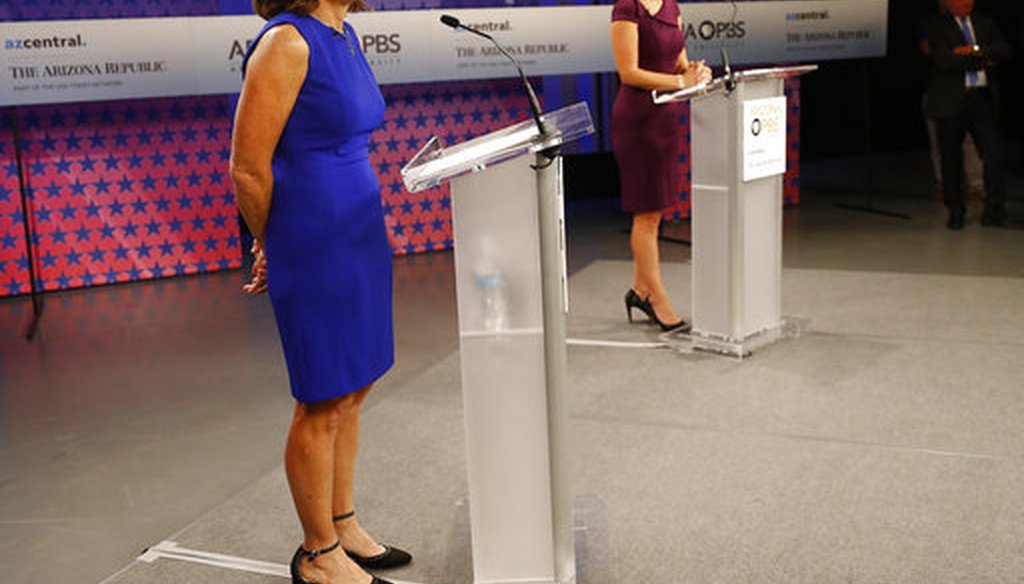Stand up for the facts!
Our only agenda is to publish the truth so you can be an informed participant in democracy.
We need your help.
I would like to contribute

U.S. Senate candidates, U.S. Rep. Martha McSally, R-Ariz., left, and U.S. Rep. Kyrsten Sinema, D-Ariz., debated Oct. 15, 2018, in Phoenix. (AP Photo)
PolitiFact has been fact-checking races in 16 states this year. Here is our summary of where the races stand in the final days before elections.
Arizona
Candidates: Republican Rep. Martha McSally vs. Democratic Rep. Kyrsten Sinema
The race between Sinema and McSally for the open seat held by retiring Sen. Jeff Flake has been filled with aggressive campaigning between two current members of the U.S. House of Representatives.
Since entering the Senate race, McSally has adopted a more conservative stance on immigration and has become more vocal in calls to build a border wall with Mexico. An Air Force veteran, McSally serves on the Armed Services and Homeland Security committees; she was first elected to Congress in 2014. Some of McSally’s campaign has focused on attacking Sinema for her role as an activist opposing the Iraq War.
Sinema, a member of Congress since 2013, serves on the House Committee on Financial Services. Sinema is campaigning as an independent — her promises include expansion of health care access. Sinema was one of 18 Democrats who voted in favor of a July resolution stating explicit support for Immigration and Customs Enforcement and denouncing calls to abolish the agency. Most Democrats voted "present."
The candidates voted with their parties on the Republican tax bill (McSally voted for it, Sinema against) and on the 2017 effort to repeal of the Affordable Care Act (McSally voted for it, Sinema against).
Fact-checks:
McSally: Says she’s "leading the fight" to "force insurance companies to cover pre-existing conditions." Mostly False
Sinema: Says she voted to stop a new "age tax" under which "Arizonans age 50 & over could be charged 5 times more for their health care." Half True
California
Candidates: Democratic incumbent Dianne Feinstein vs. Democratic challenger State Sen. Kevin de León
Two Democrats are squaring off due to California’s ‘top-two’ primary system, in which voters select the top two candidates regardless of party affiliation.
Feinstein is the longtime incumbent who was first elected to the Senate in 1992. She drew criticism this year for her role as the leading Democrat on the committee that oversaw Justice Brett Kavanaugh’s Supreme Court confirmation hearings. Conservatives said she was unfair to Kavanaugh; progressives said she wasn’t aggressive enough.
De León was elected to the California State Assembly in 2006. Four years later he was elected to the State Senate. He became the State Senate Leader in 2014.
De León won the endorsement of the California Democratic Party in July 2018 and is considered more liberal than Feinstein. Polling, however, has showed Feinstein leading the race.
Fact-checks:
De León: Clean energy employs "more than half a million Californians. That’s nearly ten times more the number of coal mining jobs that exist in the entire nation." Mostly True
Feinstein: "Teachers spend $1.6 BILLION per year on school supplies. The Republican tax bill ELIMINATES their ability to deduct those expenses." Half True
Florida
Candidates: Democratic incumbent Sen. Bill Nelson vs. Republican Gov. Rick Scott
Nelson, first elected to the U.S. Senate in 2000, has been a familiar fixture of Florida politics for decades and is currently the only statewide Democratic officer holder. He’s being challenged by Scott, the two-term governor of Florida, who’s painted Nelson as a career politician and a socialist.
The Florida Senate race is expected to be one of the most expensive Senate races in the nation. It should also be close; polls show Scott and Nelson running neck and neck. The only questions left are which way independents will lean and whether the attention drawn by Tallahassee Mayor Andrew Gillum, the African-American Democrat running for governor, will carry over to more Democrats turning out to vote for Nelson.
Scott, an ally of President Donald Trump, has emphasized his promise, largely fulfilled, to create 700,000 jobs in 7 years. While Scott ran as a conservative in 2010, he moderated some of his views during his tenure, including on immigration.
Scott is also known for his prior tenure as CEO of Columbia/HCA, a hospital company, where he quit in 1997 shortly after federal agents went public with an investigation into the company that later led to a $1.7 billion fine for defrauding Medicare, TriCare and other government health care programs.
Fact-checks:
Scott: Says Sen. Bill Nelson "voted for higher taxes" 349 times. False
Scott: Says Sen. Bill Nelson is a socialist. Pants on Fire
Priorities USA Action: "If Rick Scott had his way he would encourage racially profiling immigrant communities here in Florida. He also opposed allowing Dreamers to remain in the U.S." Mostly False
Indiana
Candidates: Democratic incumbent Sen. Joe Donnelly vs. Republican Mike Braun
Donnelly is a moderate Democrat fighting to hang onto his seat in a state Trump carried by 19 points. He was elected to the Senate in 2012 and previously served three terms as a U.S. representative.
Braun is a Republican state senator who likens himself to Trump as an outsider and businessman. On the campaign, Braun frequently touts his accomplishments in his private business, an automobile parts distribution company. Donnelly has used that as ammunition to showcase problems in Braun’s business practices.
In return, Braun and Republican PACs have tried to paint Donnelly as ineffective and more liberal than his voting record shows, particularly on immigration.
Fact-checks:
Donnelly: Says "43 of Joe’s legislative proposals have become law, including 21 since President Trump took office." Mostly True
National Republican Senatorial Committee: "We know dangerous criminals can slip through immigration at airports just like ours. Yet Joe Donnelly stood right here with the radical left against all efforts to secure our most vulnerable entry points." False
Donnelly: "At (Mike Braun’s) company, the deductible on his health care is $10,000." Mostly True
Minnesota
Candidates: Incumbent Democrat Tina Smith vs. state Sen. Karin Housley
Smith was appointed to the Senate to replace Democrat Al Franken, who resigned amid accusations of improprieties with women. She prevailed over several Democratic contenders in the Aug. 14 primary. On the Republican side, Housley, a state legislator, is the nominee.
This is actually one of two U.S. Senate races in Minnesota in November, but the other — the reelection bid by Democratic Sen. Amy Klobuchar — isn’t considered competitive. Smith has maintained modest leads for the duration of the campaign.
Fact-checks:
Housley: "Tina (Smith) profited from the opioid crisis." False
Smith: "Taking into account inflation, the federal minimum wage is actually worth less than what it was worth 50 years ago." True
Smith: "On average, American women only earn 80 cents for every dollar a man earns for doing the same job." Mostly False
Candidates: Incumbent Democrat Claire McCaskill vs. Republican state Attorney General Josh Hawley
McCaskill was first elected in 2006, and despite Missouri increasingly becoming a red state, she won a second term in 2012 against controversial social conservative Todd Akin. Since then, McCaskill has been in Republicans’ sights.
Hawley has been touting his conservative credentials in a state that has become more red in recent election cycles, as well as highlighting McCaskill’s long tenure in Washington, saying she’s out of touch. The contest has been among the closest in the country for most of the campaign.
The two have sparred over such issues as health care; Hawley signed on to a lawsuit to overturn the Affordable Care Act, which McCaskill says threatens protections for preexisting conditions. Hawley championed the Supreme Court nomination of Brett Kavanaugh, while McCaskill voted against it.
Fact-checks:
Josh Hawley: Says a bill co-sponsored by Sen. Claire McCaskill "would give a free pass to any illegal immigrant who brings a child to the border." False
McCaskill: "I voted to defund sanctuary cities." Half True
McCaskill: "I made my decision on Kavanaugh before the allegations surfaced, and it was all about Kavanaugh's alliance and allegiance to dark money and unlimited political contributions." Mostly False
Candidates: Incumbent Democrat Jon Tester vs. Republican Matthew Rosendale
This race may come down to the wire, according to polling data. Tester, a Democratic incumbent running in a state that Trump won handily in 2016, is considered vulnerable. He provoked Trump’s ire by derailing White House physician Ronny Jackson’s nomination to head the Department of Veterans Affairs, and by voting against Trump’s Supreme Court nominee Brett Kavanaugh. Trump has endorsed Rosendale, and rallied for him in Montana.
Tester has been a U.S. senator since 2006. He is currently ranking member on the Senate Veterans’ Affairs Committee, a particularly meaningful role given Montana’s large veteran population. Prior to becoming a U.S. senator, he served in the state Legislature, where he was president of the Montana Senate.
Rosendale clinched his primary June 5 with support from former Trump White strategist Steve Bannon and financial backing from conservative groups. Rosendale, the state auditor, previously served in the state Legislature, where he was first elected in 2010.
Fact-checks:
Rosendale: Says Tester "believes that we should have a national registration so that the people of Montana should have to ask permission before they purchase a gun, ask permission from the federal government." Pants on Fire
Tester: Says Rosendale "consistently supported land use rules that would help developers like him and hurt farmers in Montana." Half True
Tester: Says Rosendale supports plans that don’t cover pre-existing conditions. True
Nevada
Candidates: Incumbent Republican Dean Heller vs. Democrat U.S. Rep. Jacky Rosen
Heller was elected in 2012 after being appointed by Nevada Gov. Brian Sandoval. Before that, he served three terms as U.S. Representative from Nevada’s 2nd Congressional District, and before that, three terms as secretary of state. Heller co-sponsored the last-ditch Republican effort to pass a health care bill to replace the Affordable Care Act with block grants to the states.
Rosen is a first-term representative from Nevada’s 3rd Congressional District, which extends from the southern portion of Las Vegas to many smaller communities southwest of the city. She worked as a systems analyst for CitiBank and Southwest Gas, a regional utility. She supports the Affordable Care Act and has criticized the Republican tax bill as too generous to the wealthy.
The race is considered a toss-up. Democrat Hillary Clinton won Nevada in 2016 by less than 2 percent, and while Heller is vulnerable and some polls give Rosen the edge, it is only by a slim margin.
Fact-checks:
Heller: Says Jacky Rosen promised "to repeal middle-class tax cut." Mostly False
Rosen: Says Dean Heller helped "craft a partisan repeal bill that also would have slashed coverage protections for people with pre-existing conditions." Half True
Democratic Senatorial Campaign Committee: Says Dean Heller "broke that promise" to protect expanded Medicaid. Half True
Senate Leadership Fund (Republican): Says Jacky Rosen "voted against stopping criminals from re-entering the United States." Mostly False
Candidates: Incumbent Democrat Heidi Heitkamp vs. Republican U.S. Rep. Kevin Cramer
Heitkamp won a rare statewide victory for a Democrat in North Dakota in 2012 by a margin of less than 1 percent. While she is one of the more moderate Democrats, the state has swung right since her election. Trump won the state with a 36-point margin.
Cramer is the state’s sole representative in the House, a seat he has held since 2013. He was also one of the first Republicans to endorse Trump, and served as a close adviser in crafting the Trump administration’s energy agenda.
Immigration, health care and personal attacks have dominated the race. Republicans have tried to paint the moderate Heitkamp as far more liberal than her record shows. Heitkamp has in turn attacked Cramer on his health care votes, saying he would strip coverage from North Dakotans with pre-existing conditions.
Fact-checks:
Cramer: "Protections on pre-existing conditions have been there since the 1970s." False
Senate Leadership Fund: "Washington Heidi supports sanctuary cities, where illegal immigrants can be released on our streets, like this criminal, who was let go and then sexually assaulted a child." Mostly False
Heitkamp: "On the Public Service Commission, (Kevin Cramer) raised his pay to over $93,650." False
Candidates: Incumbent Democrat Sherrod Brown vs. Republican U.S. Rep. Jim Renacci
Brown joined the U.S. Senate in 2007 after serving in the Ohio House, as Ohio secretary of state and in Congress. Brown, the only statewide Democrat in Ohio, is best known in the Senate for his longtime opposition to trade agreements and his support for labor.
Renacci, endorsed by Trump, represents Ohio's 16th Congressional District and was first elected to Congress in 2010. He previously served as the mayor of Wadsworth and owned multiple businesses including nursing facilities, a CPA firm, real estate and auto dealerships. He easily won the May primary against businessman Mike Gibbons.
This race has been less competitive than the governor’s race, according to many polls that have shown Brown with a lead. In 2016, Donald Trump won the state by 8 percentage points.
Fact-checks:
Renacci: "President Trump is still supported by almost 85 percent of the Republican Party in the state of Ohio, and that's from recent polling, and still has a 58 percent approval rating in Ohio." Mostly True
Republican Party of Ohio: Says Sherrod Brown in 1978 "voted for stricter removal standards (for voter registration) and then enforced them as Secretary of State." Half True
Brown: "Right now in Ohio 200,000 people are getting opioid treatment because they have insurance under the Affordable Care Act." True
Brown: "Jim Renacci has been a lobbyist even while in Congress" and "voted to make it easier for lobbyists to hold key government positions and harder to investigate conflicts of interest." Mostly False
Candidates: Republican Rep. Marsha Blackburn vs. Democrat Phil Bredesen
Blackburn was first elected in 2002 to represent Tennessee’s 7th Congressional District and has been re-elected ever since, never falling below winning 66 percent of the vote. She opposes abortion and is a member of the Pro-Life Caucus. She voted for the 2017 House bill to repeal the Affordable Care Act, and supports the Republican tax law. Blackburn has embraced President Donald Trump, and he has come to Tennessee for rallies to boost her chances. The only issue where she has distanced herself slightly from Trump is on tariffs, which would affect Tennessee firms, including the auto industry.
Bredesen was Tennessee’s governor from 2003 to 2011 and was mayor of Nashville through most of the 1990s. Before he turned to politics, Bredesen built what became one of the country’s largest investor-owned health maintenance organizations at the time. Bredesen positions himself as a pragmatist, saying he will work with Trump when his policies would help the state, and oppose him when he thinks they wouldn’t. He has spoken out against trade tariffs. He criticized the Affordable Care Act when it passed in 2010, but has since softened his stance to say it should be fixed.
This race is is close. Outside groups bought many ads in the race.
Fact-checks:
Blackburn: Says Phil Bredesen "lured illegal immigrants to Tennessee." Mostly False
Bredesen: Says Marsha Blackburn "at the behest of the pharmaceutical industry, co-sponsored a law that weakened DEA enforcement efforts against drug distribution companies that were supplying corrupt doctors and pharmacists who peddled narcotics to the black market." Mostly True
Senate Leadership Fund (Republican): Says Tennessee Senate candidate Phil Bredesen "supports single-payer health care." Mostly False
Taylor Swift: Says Marsha Blackburn "voted against the Reauthorization of the Violence Against Women Act, which attempts to protect women from domestic violence, stalking, and date rape." Mostly True
Texas
Candidates: Incumbent Ted Cruz vs. Democratic U.S. Rep. Beto O’Rourke
Cruz seeks his second term after a high-profile run for the Republican nomination for president in 2016; he lost to Donald Trump. After feuding with Trump for the presidential nomination, Cruz has since campaigned with President Trump for his Senate re-election. Cruz has campaigned against illegal immigration and for low taxes and less regulation.
O’Rourke, a member of the U.S. House of Representatives representing the El Paso area, has challenged Cruz in a bid that has drawn support from Democrats around the country. O’Rourke has emphasized bipartisanship, health care, more open immigration policies and criminal justice reform.
Fact-checks:
Cruz: Says Beto O'Rourke "voted in favor of a $10 a barrel tax on every barrel of oil produced in the state of Texas." Mostly False
O’Rourke: Says he "did not try to leave the scene of the accident" that led to his arrest for driving while intoxicated. Mostly False
Cruz: Says O’Rourke had a "resolution to legalize all narcotics--including heroin and other deadly opioids." False
Utah
Candidates: Republican Mitt Romney vs. Democrat Jenny Wilson
After seven terms in the U.S. Senate, incumbent Republican Sen. Orrin Hatch announced his plan to retire in January 2018. Hatch said he would only retire if Romney ran. In spite of his attacks on Trump during the 2016 election, Romney counts on Trump’s endorsement.
Wilson has been an at-large member of the Salt Lake County Council since 2005.
Romney’s path to clinch the Senate seat in the general election has been one of the most serene this cycle, with polls consistently showing a significant lead.
Fact-checks:
Wilson: Says Romney is using "a million of his presidential campaign dollars to finance his Utah Senate race." True
Virginia
Candidates: Incumbent Democrat Tim Kaine vs. Republican Corey Stewart
Kaine, who formerly served as governor and later as chairman of the Democratic National Committee, won his Senate seat in 2012. He was selected in 2016 to serve as Democratic presidential nominee Hillary Clinton’s vice presidential running mate. He has remained a leading critic of Trump.
Stewart, chair of the Prince William County Board of Supervisors and the Trump campaign’s former Virginia state chair, has called himself "Trump before Trump was Trump" and pledged support to the president’s agenda. He has come under fire for his ties to avowed white supremacists and anti-Semites.
Kaine is considered a favorite to retain his seat.
Fact-checks:
Stewart: Kaine "opposes everything President Trump does." Mostly True
Stewart: "I have always condemned … any of these white supremacists or bigots or anything like that." Mostly False
Kaine: "In December of 2017, the Prince William board of supervisors had a meeting ... (Corey Stewart) skipped that meeting to go campaign in Alabama for Roy Moore to be a U.S. senator … You haven't disavowed Roy Moore's name yet." True
Candidates: Incumbent Democrat Joe Manchin vs. Republican state Attorney General Patrick Morrisey
Manchin, who formerly served as governor, won his Senate seat in a special election in 2010 and was elected to a full term two years later.
Since his initial election, West Virginia has become an increasingly Republican state, raising Republicans’ hopes of ousting him. But Manchin, a conservative Democrat, is a longtime fixture in the state’s politics, and he’s made nods in some key votes to Trump, who won the state with 68 percent of the vote.
Morrisey, elected state attorney general in 2012, has touted his conservative positions on issues such as abortion and guns, and he’s charged that Manchin can’t represent the state as a member of the Democratic Party because the national party is at odds with many issues important to West Virginians, including coal and the environment.
Manchin has maintained a narrow edge through much of the campaign.
Fact-checks:
Manchin: Says Patrick Morrisey undertook "efforts to put educators in jail." False
Manchin: "I voted to fund President Trump’s wall." Mostly True
Morrisey: Says Sen. Joe Manchin "stands with Hillary Clinton and D.C. Dems on gun control, higher taxes, amnesty, and Planned Parenthood." Half True
Morrisey: "Joe Manchin has a ‘D' rating from the NRA." Mostly True
Wisconsin
Candidates: Incumbent Democrat Tammy Baldwin vs. Republican Leah Vukmir.
Baldwin, of Madison, is a first-term incumbent. The race she won in 2012 was for an open seat. Baldwin previously served in the U.S. House and in the Wisconsin Legislature.
Vukmir, of suburban Milwaukee, is a nurse who currently serves in the Wisconsin Senate. She is endorsed by the Wisconsin Republican Party and touts herself as a proven conservative.
Baldwin has had the advantages of incumbency and no primary opponent, as well as more name recognition than her opponents, but Wisconsin can be a hard to state to figure. For example, Baldwin is one of the most liberal members of the Senate while Wisconsin’s other senator, Republican Ron Johnson, is one of the most conservative.
Fact-checks:
Vukmir: Says Baldwin was the only member of the Wisconsin congressional delegation "to have a report outlining that a doctor was overprescribing opioids" at the Tomah VA, "later a veteran died" and Baldwin "covered it up." Mostly False
Baldwin: Says Donald Trump's executive order "doesn't address the over 2,000 children who are already separated from their parents, and it doesn't change the fact that we would be jailing children with their families." Mostly True
Vukmir: Says Tammy Baldwin "opposed displaying the flag and reciting the Pledge of Allegiance or singing the National Anthem in our classrooms." Mostly False
Our Sources
See fact-checks for sources.





































